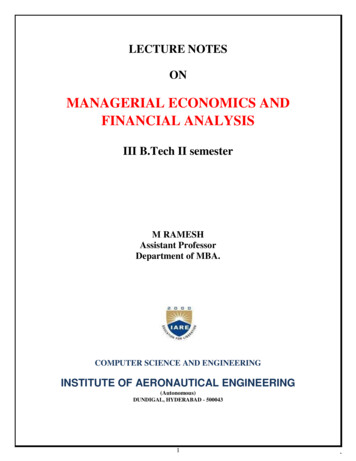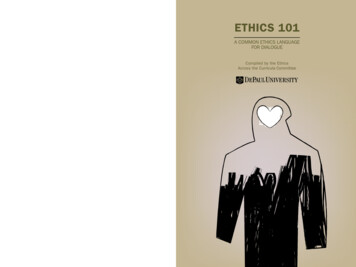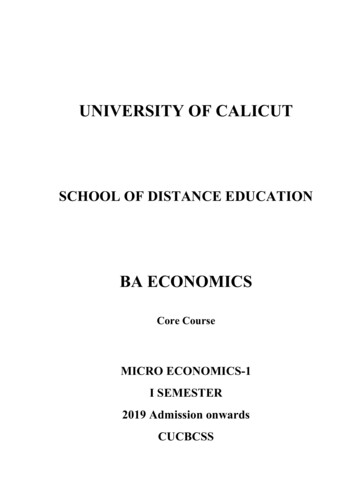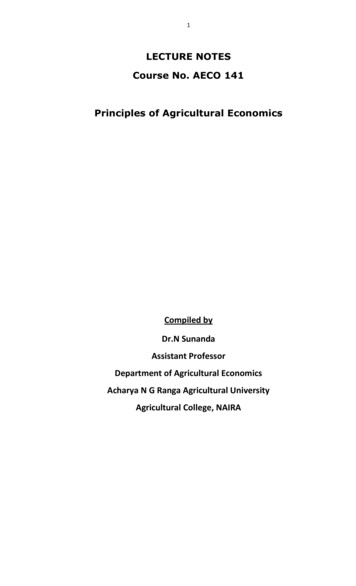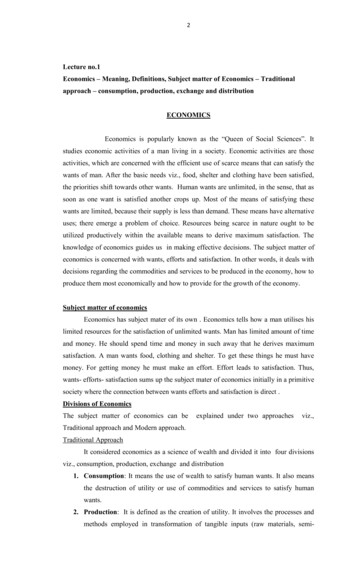
Transcription
The Economics and Ethicsof Private PropertyStudies in Political Economy and PhilosophySecond EditionHans-Hermann HoppeLudwigvon MisesInstituteAUBURN, ALABAMA
Copyright 1993 by Kluwer Academic PublishersCopyright 2006 by the Ludwig von Mises InstituteAll rights reserved. No part of this book may be reproduced in any mannerwhatsoever without written permission except in the case of reprints in thecontext of reviews. For information write the Ludwig von Mises Institute,518 West Magnolia Avenue, Auburn, Alabama 36832.Paperback EditionISBN: 978-1-61016-679-9
TO MURRAY N. ROTHBARD
CONTENTSPreface to the Second Edition . . . . . . . . . . . . . . . . . . . . . . . . . . . . . . . . . . ixPreface to the First Edition. . . . . . . . . . . . . . . . . . . . . . . . . . . . . . . . . . . . . xiPART ONE - ECONOMICS1 Fallacies of the Public Goods Theory and the Productionof Security . . . . . . . . . . . . . . . . . . . . . . . . . . . . . . . . . . . . . . . . . . . . . 32 The Economics and Sociology of Taxation . . . . . . . . . . . . . . . . . . 333 Banking, Nation States, and International Politics: ASociological Reconstruction of the Present Economic Order . . 774 Marxist and Austrian Class Analysis . . . . . . . . . . . . . . . . . . . . . . . 1175 Theory of Employment, Money, Interest, and the CapitalistProcess: The Misesian Case Against Keynes. . . . . . . . . . . . . . . 1396 How is Fiat Money Possible?—or, The Devolution ofMoney and Credit . . . . . . . . . . . . . . . . . . . . . . . . . . . . . . . . . . . . 1757 Against Fiduciary Media . . . . . . . . . . . . . . . . . . . . . . . . . . . . . . . . 2058 Socialism: A Property or Knowledge Problem? . . . . . . . . . . . . . 255PART TWO - PHILOSOPHY9 On Praxeology and the Praxeological Foundation ofEpistemology . . . . . . . . . . . . . . . . . . . . . . . . . . . . . . . . . . . . . . . .10 Is Research Based on Causal Scientific Principles Possible inthe Social Sciences? . . . . . . . . . . . . . . . . . . . . . . . . . . . . . . . . . .11 From the Economics of Laissez Faire to the Ethics ofLibertarianism. . . . . . . . . . . . . . . . . . . . . . . . . . . . . . . . . . . . . . . .12 The Justice of Economic Efficiency . . . . . . . . . . . . . . . . . . . . . .13 On the Ultimate Justification of the Ethics of PrivateProperty . . . . . . . . . . . . . . . . . . . . . . . . . . . . . . . . . . . . . . . . . . . . .14 Austrian Rationalism in the Age of the Decline of Positivism . .15 Rothbardian Ethics. . . . . . . . . . . . . . . . . . . . . . . . . . . . . . . . . . . . .265295305331339347381Appendix: Four Critical Replies . . . . . . . . . . . . . . . . . . . . . . . . . . . . . . . 399Subject Index . . . . . . . . . . . . . . . . . . . . . . . . . . . . . . . . . . . . . . . . . . . . . . 419Name Index. . . . . . . . . . . . . . . . . . . . . . . . . . . . . . . . . . . . . . . . . . . . . . . . 429vii
Preface to the Second EditionThe first edition of The Economics and Ethics of Private Property, published in 1993, has been out of print for several years.For some time and from many sides I have been urged to prepare a new edition, and Llewellyn Rockwell has graciously offeredthe Ludwig von Mises Institute to serve as its publisher.The Economics and Ethics of Private Property was dedicated to myteacher and mentor, Murray N. Rothbard, with whom I had beenclosely associated during the last ten years of his life, first as a visiting scholar at the Brooklyn Polytechnic Institute in New York Cityand after 1986 as a colleague at the University of Nevada, Las Vegas.The year 2005 marks the tenth anniversary of Rothbard’s death.Thus, it seemed a most appropriate time to honor Murray anew withthis second edition.The present edition of The Economics and Ethics of Private Property is enlarged. It adds four articles written after the original publication of the book but related thematically to its central subject matter of the economic and ethic rationale of the institution of privateproperty—chapters 6, 7, 8, and 15. The opportunity of a new editionhas also been used to make significant editorial improvements andrevisions.Hans Hermann HoppeLas Vegas, Nevada, 2005ix
Preface to the First EditionThe collapse of socialism across Eastern Europe—as manifested most dramatically by the events of the forever memorable November 9, 1989, when the Germans of East and Westreunited, moved and overjoyed, on top of the Berlin Wall—has addedmore support and urgency to the central thesis of this volume than Ihad ever hoped for.Whether the following studies deal with economic topics such asemployment, interest, money, banking, business cycles, taxes, publicgoods, or growth; with philosophical problems as the foundations ofknowledge, and of economics and ethics in particular; or the reconstruction and theoretical explanation of historical and sociologicalphenomena such as exploitation, the rise and fall of civilizations,international politics, war, imperialism, and the role of ideas and ideological movements in the course of social evolution—each ultimately contributes to but one conclusion: The right to private property is an indisputably valid, absolute principle of ethics and the basisfor continuous “optimal” economic progress. To rise from the ruinsof socialism and overcome the stagnation of the Western welfarestates, nothing will suffice but the uncompromising privatization ofall socialized, that is, government, property and the establishment ofa contractual society based on the recognition of the absoluteness ofprivate property rights.xi
xiiThe Economics and Ethics of Private PropertyIn writing the following studies I received help from many sides.Special thanks go to my wife Margaret, who again took on the task ofde-Germanizing my English; to Llewellyn H. Rockwell, Jr., presidentof the Ludwig von Mises Institute, and to Burton S. Blumert, president of the Center for Libertarian Studies, for their continuing support of my work; and to my friend David Gordon, for his numerousinvaluable suggestions and comments.My largest debt is to Ludwig von Mises and Murray N. Rothbard,the twentieth century’s two greatest—though much neglected—economists and social philosophers. While I never met Ludwig von Mises,and indeed had not heard of his name until after his death, I am fortunate to have been closely associated with Murray Rothbard for thepast six years, first in New York City, and since 1986 as colleagues atthe University of Nevada, Las Vegas. Apart from the intellectual debtthat I owe him, words cannot express my personal gratitude. His wisdom, insight, kindness, enthusiasm, and unflagging encouragementhave been a continuous inspiration to me. It is, therefore, to him thatthis volume is dedicated.Hans-Hermann HoppeLas Vegas, Nevada, 1993
Part OneECONOMICS
1Fallacies of the PublicGoods Theory and theProduction of SecurityIn 1849, at a time when classical liberalism was still the dominantideological force and “economist” and “socialist” were generallyconsidered antonyms, Gustave de Molinari, a renowned Belgianeconomist, wrote,If there is one well-established truth in political economy, it is this:That in all cases, of all commodities that serve to provide for thetangible or intangible need of the consumer, it is in the consumer’s best interest that labor and trade remain free, because thefreedom of labor and trade have as their necessary and permanentresult the maximum reduction of price. And this: That the interest of the consumer of any commodity whatsoever should alwaysprevail over the interests of the producer. Now, in pursuing theseprinciples, one arrives at this rigorous conclusion: That the production of security should in the interest of consumers of thisintangible commodity remain subject to the law of free competition. Whence it follows: That no government should have theright to prevent another government from going into competition[Reprinted from the Journal of Libertarian Studies 9, no. 1 (Winter 1989).]3
4The Economics and Ethics of Private Propertywith it, or require consumers of security to come exclusively to itfor this commodity.1He comments on this whole argument by saying, “Either this is logical and true, or else the principles on which economic science isbased are invalid.”2There is apparently only one way out of this unpleasant (for allsocialists, that is) conclusion: to argue that there are particular goodsto which for some special reasons the above economic reasoning doesnot apply. It is this that the so-called public goods theorists are determined to prove.3 However, I will demonstrate that in fact no suchspecial goods or special reasons exist, and that the production ofsecurity in particular does not pose a problem any different from thatof the production of any other good or service, be it houses, cheese,or insurance. In spite of its many followers, the whole public goodstheory is faulty, flashy reasoning, riddled with internal inconsistencies, non sequiturs, appealing to and playing on popular prejudicesand assumed beliefs, but with no scientific merit whatsoever.4What, then, does the escape route that socialist economists havefound in order to avoid drawing Molinari’s conclusion look like?Since Molinari’s time it has become more common to answer yes to1Gustave de Molinari, The Production of Security, trans. J. HustonMcCulloch (New York: Center for Libertarian Studies, Occasional Paper SeriesNo. 2, 1977), p. 3.2Ibid., p. 4.3For various approaches of public goods theorists, see James M. Buchananand Gordon Tullock, The Calculus of Consent (Ann Arbor: University ofMichigan Press, 1962); James M. Buchanan, The Public Finances (Homewood,Ill.: Richard Irwin, 1970); idem, The Limits of Liberty (Chicago: University ofChicago Press, 1975); Gordon Tullock, Private Wants, Public Means (New York:Basic Books, 1970); Mancur Olson, The Logic of Collective Action (Cambridge,Mass.: Harvard University Press, 1965); William J. Baumol, Welfare Economicsand the Theory of the State (Cambridge: Harvard University Press, 1952).4See on the following, Murray N. Rothbard, Man, Economy, and State (LosAngeles: Nash, 1970), pp. 883ff.; idem, “The Myth of Neutral Taxation,” CatoJournal (1981); Walter Block, “Free Market Transportation: Denationalizing theRoads,” Journal of Libertarian Studies 3, no. 2 (1979); idem, “Public Goods andExternalities: The Case of Roads,” Journal of Libertarian Studies 7, no. 1 (1983).
Fallacies of the Public Goods Theory and the Production of Security5the question of whether there are goods to which different sorts ofeconomic analyses apply. As a matter of fact, it is almost impossibleto find a single contemporary economics textbook that does not stressthe vital importance of the distinction between private goods, forwhich the truth of the economic superiority of a capitalist order ofproduction is generally admitted, and public goods, for which it isgenerally denied.5 Certain goods or services (including security) aresaid to be special because their enjoyment cannot be restricted tothose who have actually financed their production. Rather, peoplewho do not participate in financing them also draw benefits fromthem. Such goods are called public goods or services (as opposed toprivate goods or services, which exclusively benefit those people whoactually pay for them). Because of this special feature of publicgoods, it is argued, markets cannot produce them, or at least not insufficient quantity or quality; hence, compensatory state action isrequired.65See for instance, William J. Baumol and Alan S. Blinder, Economics,Principles and Policy (New York: Harcourt, Brace, Jovanovich, 1979), chap. 31.6Another frequently used criterion for public goods is that of “nonrivalrousconsumption.” Generally, both criteria seem to coincide: When free riders cannot be excluded, nonrivalrous consumption is possible; and when they can beexcluded, consumption becomes rivalrous, or so it seems. However, as publicgoods theorists argue, this coincidence is not perfect. It is, they say, conceivablethat while the exclusion of free riders might be possible, their inclusion mightnot be connected with any additional cost (the marginal cost of admitting freeriders is zero, that is), and that the consumption of the good in question by theadditionally admitted free rider will not necessarily lead to a subtraction in theconsumption of the good available to others. Such a good would be a publicgood, too. And since exclusion would be practiced on the free market and thegood would not become available for nonrivalrous consumption to everyone itotherwise could—even though this would require no additional costs—this,according to statist-socialist logic, would prove a market failure, i.e., a suboptimallevel of consumption. Hence the state would have to take over the provision ofsuch goods. (A movie theater, for instance, might be only half full, so it might be“costless” to admit additional viewers free of charge, and their watching the moviealso might not affect the paying viewers; hence the movie would qualify as a public good. Since, however, the owner of the theater would be engaging in exclusion,instead of letting free riders enjoy a “costless” performance, movie theaters would
6The Economics and Ethics of Private PropertyThe examples given by different authors of alleged public goodsvary widely. Authors often classify the same good or service differently, leaving almost no classification of a particular good undisputed, which clearly foreshadows the illusory character of the wholedistinction.7 Nonetheless, some examples that enjoy particularly popular status as public goods are the fire brigade that stops a neighbor’shouse from catching fire, thereby letting him profit from my firebrigade, even though he did not contribute anything to financing it;or the police that, by walking around my property scare away potential burglars from my neighbor’s property as well, even if he did nothelp finance the patrols; or the lighthouse, an example particularlydear to economists,8 that helps a ship find its way even though theship’s owner did not contribute a penny to its construction or upkeep.Before continuing with the presentation and critical examinationof the theory of public goods, I will investigate how useful the distinction between private and public goods is in helping decide whatshould be produced privately and what should be provided by thestate or with state help. Even the most superficial analysis could notfail to point out that using the alleged criterion of inexcludability,rather than presenting a sensible solution, would get one into deeptrouble. While at least at first glance it seems that some of the stateprovided goods and services might indeed qualify as public goods, itcertainly is not obvious how many of the goods and services that areactually produced by states could come under the heading of publicgoods. Railroads, postal services, telephone, streets, and the likeseem to be goods whose usage can be restricted to the persons whoactually finance them, and hence appear to be private goods. And thesame seems to be the case regarding many aspects of the multidimensional good “security”: everything for which insurance could betaken out would have to qualify as a private good. Yet this does notbe ripe for nationalization.) On the numerous fallacies involved in defining publicgoods in terms of nonrivalrous consumption see notes 12 and 17 below.7On this subject Walter Block, “Public Goods and Externalities.”8See for instance Buchanan, The Public Finances, p. 23; Paul Samuelson,Economics (New York: McGraw Hill, 1976), p. 166.
Fallacies of the Public Goods Theory and the Production of Security7suffice. Just as many state-provided goods appear to be privategoods, so many privately produced goods seem to fit in the categoryof a public good. Clearly my neighbors would profit from my wellkept rose garden—they could enjoy the sight of it without ever helping me garden. The same is true of all kinds of improvements that Icould make on my property that would enhance the value of neighboring property as well. Even those people who do not throw moneyin his hat can profit from a street musician’s performance. Those fellow passengers on the bus who did not help me buy it profit from mydeodorant. And everyone who ever meets me would profit from myefforts, undertaken without their financial support, to turn myself intoa most lovable person. Now, do all these goods—rose gardens, property improvements, street music, deodorants, personal improvements—since they clearly seem to possess the characteristics of publicgoods, then have to be provided by the state or with state assistance?As these examples of privately produced public goods indicate,there is something seriously wrong with the thesis of public goodstheorists that public goods cannot be produced privately, but insteadrequire state intervention. Clearly they can be provided by markets.Furthermore, historical evidence shows us that all of the so-calledpublic goods that states now provide have at some time in the pastactually been provided by private entrepreneurs or even today are soprovided in one country or another. For example, the postal servicewas once private almost everywhere; streets were privately financedand still are sometimes; even the beloved lighthouses were originallythe result of private enterprise;9 private police forces, detectives, andarbitrators exist; and help for the sick, the poor, the elderly, orphans,and widows has been a traditional concern of private charity organizations. To say, then, that such things cannot be produced by a puremarket system is falsified by experience a hundredfold.Apart from this, other difficulties arise when the public-privategoods distinction is used to decide what and what not to leave to themarket. For instance, what if the production of so-called public goods9See Ronald Coase, “The Lighthouse in Economics,” Journal of Law andEconomics 17 (1974).
8The Economics and Ethics of Private Propertydid not have positive but had negative consequences for other people, or if the consequences were positive for some and negative forothers? What if the neighbor whose house was saved from burningby my fire brigade had wished (perhaps because he was overinsured)that it had burned down; or my neighbors hate roses, or my fellowpassengers find the scent of my deodorant disgusting? In addition,changes in the technology can change the character of a given good.For example, with the development of cable TV a good that was formerly (seemingly) public has become private. And changes in thelaws of property—of the appropriation of property—can have thevery same effect of changing the public-private character of a good.The lighthouse, for instance, is a public good only insofar as the seais publicly (not privately) owned. But if it were permitted to acquirepieces of the ocean as private property, as it would be in a purely capitalist social order, then as the lighthouse shines over only a limitedterritory, it would clearly become possible to exclude nonpayers fromthe enjoyment of its services.Leaving this somewhat sketchy level of discussion and looking intothe distinction between private and public goods more thoroughly,we discover that the distinction turns out to be completely illusory. Aclear-cut dichotomy between private and public goods does not exist,and this is essentially why there can be so many disagreements onhow to classify a given good. All goods are more or less private orpublic and can—and constantly do—change with respect to theirdegree of privateness/publicness as people’s values and evaluationschange, and as changes occur in the composition of the population.In order to recognize that they never fall, once and for all, into eitherone or the other category, one must only recall what makes something a good. For something to be a good it must be recognized andtreated as scarce by someone. Something is not a good as such, thatis to say; goods are goods only in the eyes of the beholder. Nothing isa good unless at least one person subjectively evaluates it as such. Butthen, when goods are never goods-as-such—when no physico-chemical analysis can identify something as an economic good—there isclearly no fixed, objective criterion for classifying goods as either private or public. They can never be private or public goods as such.Their private or public character depends on how few or how manypeople consider them to be goods, with the degree to which they are
Fallacies of the Public Goods Theory and the Production of Security9private or public changing as these evaluations change and rangefrom one to infinity. Even seemingly completely private things likethe interior of my apartment or the color of my underwear can thusbecome public goods as soon as somebody else starts caring aboutthem.10 And seemingly public goods, like the exterior of my house orthe color of my overalls, can become extremely private goods as soonas other people stop caring about them. Moreover, every good canchange its characteristics again and again; it can even turn from apublic or private good to a public or private bad or evil and vice versa,depending solely on the changes in this caring or uncaring. If this isso, then no decision whatsoever can be based on the classification ofgoods as private or public.11 In fact, to do so it would become necessary to ask virtually every individual with respect to every single goodwhether or not he happened to care about it—positively or negativelyand perhaps to what extent—in order to determine who might profitfrom what and who should therefore participate in the good’s financing. (And how could one know if they were telling the truth?) Itwould also become necessary to monitor all changes in such evaluations continuously, with the result that no definite decision could everbe made regarding the production of anything, and as a consequenceof a nonsensical theory all of us would be long dead.1210See, for instance, the ironic case that Block makes for socks being publicgoods in “Public Goods and Externalities.”11To avoid any misunderstanding here, every single producer and every association of producers making joint decisions can, at any time, decide whether or notto produce a good based on an evaluation of the privateness or publicness of thegood. In fact, decisions on whether or not to produce public goods privately areconstantly made within the framework of a market economy. What is impossibleis to decide whether or not to ignore the outcome of the operation of a free market based on the assessment of the degree of privateness or publicness of a good.121n fact, then, the introduction of the distinction between private and public goods is a relapse into the pre-subjectivist era of economics. From the pointof view of subjectivist economics, no good exists that can be categorized objectively as private or public. This is essentially why the second proposed criterionfor public goods—permitting nonrivalrous consumption (see note 6 above)—breaks down too. For how could any outside observer determine whether or notthe admittance of an additional free rider at no charge would not indeed lead toa subtraction in the consumption of a good to others? Clearly there is no way
10The Economics and Ethics of Private PropertyBut even if one were to ignore all these difficulties and were willing to admit, for the sake of argument that the private-public gooddistinction does hold water, the argument would not prove what it issupposed to. It neither provides conclusive reasons why publicgoods—assuming that they exist as a separate category of goods—should be produced at all, nor why the state rather than private enterprises should produce them. This is what the theory of public goodsessentially says, having introduced the aforementioned conceptualdistinction: The positive effects of public goods for people who donot contribute anything to their production or financing proves thatthese goods are desirable. But evidently they would not be produced,or at least not in sufficient quantity and quality, in a free, competitivemarket, since not all of those who would profit from their productionwould also contribute financially to make the production possible. Inorder to produce these goods (which are evidently desirable, butwould not be produced otherwise), the state must jump in and assistin their production. This sort of reasoning, which can be found inalmost every textbook on economics (Nobel laureates notexcluded)13 is completely fallacious on two counts.that he could objectively do so. In fact, it might well be that one’s enjoyment ofa movie or of driving on a road would be considerably reduced if more peoplewere allowed in the theater or on the road. Again, to find out whether or not thisis the case one would have to ask every individual—and not everyone mightagree (what then?). Furthermore, since even a good that allows nonrivalrousconsumption is not a free good, as a consequence of admitting additional freeriders “crowding” would eventually occur, and hence everyone would have to beasked about the appropriate “margin.” In addition, my consumption may or maynot be affected depending on who it is that is admitted free of charge, so I wouldhave to be asked about this, too. And finally, everyone might change his opinionon all of these questions over time. It is thus in the same way impossible todecide whether or not a good is a candidate for state (rather than private) production based on the criterion of nonrivalrous consumption as on that of nonexcludability (see also note 17 below).13See Paul Samuelson, “The Pure Theory of Public Expenditure,” Review ofEconomics and Statistics (1954); idem, Economics, chap. 8; Milton Friedman,Capitalism and Freedom (Chicago: University of Chicago Press, 1962), chap. 2;F.A. Hayek, Law, Legislation and Liberty (Chicago: University of Chicago, 1979),vol. 3, chap. 14.
Fallacies of the Public Goods Theory and the Production of Security11For one thing, to come to the conclusion that the state has to provide public goods that otherwise would not be produced, one mustsmuggle a norm into one’s chain of reasoning. Otherwise, from thestatement that because of some special characteristics they have,certain goods would not be produced, one could never reach the conclusion that these goods should be produced. But with a normrequired to justify their conclusion, the public goods theorists clearlyhave left the bounds of economics as a positive, wertfrei science.Instead they have moved into the realm of morals or ethics, andhence one would expect to be offered a theory of ethics as a cognitivediscipline in order for them to do legitimately what they are doingand to justifiably derive their conclusion. But it can hardly be stressedenough that nowhere in public goods theory literature can anythingthat even faintly resembles such a cognitive theory of ethics be found.14Thus it must be stated at the outset, that public goods theorists are14Economists in recent years, particularly the Chicago School, have beenincreasingly concerned with the analysis of property rights. Harold Demsetz,“The Exchange and Enforcement of Property Rights,” Journal of Law andEconomics 7 (1964); idem, “Toward a Theory of Property Rights,” AmericanEconomic Review (1967); Ronald Coase, “The Problem of Social Cost,” Journalof Law and Economics 3 (1960); Armen Alchian, Economic Forces at Work(Indianapolis: Liberty Fund, 1977), part 2; Richard Posner, Economic Analysisof the Law (Boston: Brown, 1977). Such analyses, however, have nothing to dowith ethics. On the contrary, they represent attempts to substitute economic efficiency considerations for the establishment of justifiable ethical principles [onthe critique of such endeavors see Murray N. Rothbard, The Ethics of Liberty(Atlantic Highlands, N.J.: Humanities Press, 1982), chap. 26; Walter Block,“Coase and Demsetz on Private Property Rights,” Journal of Libertarian Studies1, no. 2 (1977); Ronald Dworkin, “Is Wealth a Value,” Journal of Legal Studies 9(1980); Murray N. Rothbard, “The Myth of Efficiency,” in Mario Rizzo, ed.,Time Uncertainty and Disequilibrium (Lexington, Mass.: D.C. Heath, 1979).Ultimately, all efficiency arguments are irrelevant because there simply exists nononarbitrary way of measuring, weighing, and aggregating individual utilities ordisutilities that result from some given allocation of property rights. Hence anyattempt to recommend some particular system of assigning property rights interms of its alleged maximization of “social welfare” is pseudo-scientific humbug. See in particular, Murray N. Rothbard, Toward a Reconstruction of Utilityand Welfare Economics (New York: Center for Libertarian Studies, Occasional
12The Economics and Ethics of Private Propertymisusing whatever prestige they might have as positive economistsfor pronouncements on matters on which, as their own writings indicate, they have no authority whatsoever. Perhaps, though, they havestumbled on something correct by accident, without having supported it with an elaborate moral theory? It becomes apparent thatnothing could be further from the truth as soon as one explicitly formulates the norm that would be needed to arrive at the conclusionthat the state has to assist in the provision of public goods. The normrequired to reach the above conclusion is this: whenever one cansomehow prove that the production of a particular good or servicehas a positive effect on someone else but would not be produced atall or would not be produced in a definite quantity or quality unlesscertain people participated in its financing, then the use of aggressiveviolence against these persons is allowed, either directly or indirectlywith the help of the state, and these persons may be forced to sharein the necessary financial burden. It does not need
The first edition of The Economics and Ethics of Private Prop- erty, published in 1993, has been out of print for several years. For some time and from many sides I have been urged to pre-pare a new edition, and Llewellyn Rockwell has graciously offered the Ludwig von Mises Institute to serve as its publisher.


